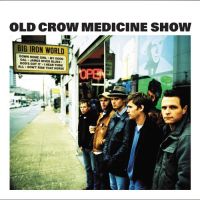 Label: Bloodshot Records
Label: Bloodshot Records Listen to the jingle, the rumble, and the roar! A familiar Train is coming up around the bend. Ladies and gentlemen, the King of Juke Joint Swing has returned after five long years since his last studio record… and he’s better than ever.
2006 has been a tremendous year for real country music. More new, solid country records have been released this year than any in recent memory. Artists who have released new albums this year range from underground powerhouses like Hank Williams III, Dale Watson, and BR549 to bona fide legends like Kris Kristofferson and Johnny Cash. As the year comes to a close, it becomes more and more difficult to find a noteworthy artist that does not have a new record in stores. For the fans of one such noteworthy artist, the wait for a new album ends on October 10th. This is the day when Wayne “The Train” Hancock’s fifth studio record Tulsa hits the shelves. In case anyone forgot who Hancock is (and I doubt anyone has), he is one of the most outstanding country songwriters in this or in any era. However, he has not had a new album since 2001, and many were likely wondering what exactly had happened to him. Well, for those worried about Wayne Hancock, Tulsa will ease their weary minds with a sound that is equal parts country and jazz. The Train is back to swing listeners to their own personal hillbilly heavens.
Even though many compare Hancock’s musical style to Hank Williams, Sr., he has just as much Bob Wills in him as he does Williams. This Wills side of The Train’s music has a strong presence on Tulsa; one that is stronger than on any Hancock album since his sophomore effort That’s What Daddy Wants. His country and jazz influences blend together perfectly to create an incredibly smooth sonic experience, whether it’s the fast, lively swing of the title track, or the mellow sway of “Ain’t Gonna Worry No More.” Helping Hancock create this sound is longtime producer Lloyd Maines and Wayne’s always-phenomenal touring band. As usual, they are on top of their game, helping to record Tulsa in only two and a half days, which explains its loose, live feel. Eddie Biebel, Dave Biller, and Paul Skelton take turns on lead guitar, while Chris Darrell maintains an always slap happy doghouse bass. Eddie Rivers’ steel guitar whines mournfully, while Bob “Texaco” Stafford and John Doyle cook up just enough jazz on trombone and clarinet, respectively, to create Hancock’s unique musical style. After almost ten years of constant touring, Wayne and the boys have perfected that style on Tulsa.
Since Wayne Hancock is country’s ultimate road warrior, playing over 200 shows a year, it should not surprise anyone that Tulsa is filled with great songs about life on the road. The first half of the record features songs about hitting the highway, while the second half explores the reasons for heading back home. Numbers like “I Don’t Care Anymore” and “Goin’ Home Blues” are tales of escape from the memories of a broken heart, and tunes such as the toe-tapper “Gonna Be Flyin’ Tonight” and the horn-fused “Goin’ Back to Texas When I’m Through” find Hancock excited for a rest from the road. Tulsa’s standout road songs are the country singer’s seemingly autobiographical “Shootin Star From Texas,” the lyrically outstanding “Back Home,” and the dark, desperate “Highway Bound.” The latter track is particularly interesting for while most of the road songs on Tulsa are “wild, free, and reckless,” “Highway Bound” finds Wayne on the edge of quiet madness. A ghostly feeling surrounds the creaky voice, as though the highway has trapped the spirit of the lonely troubadour. It is haunting as hell, and damn wonderful.
Of course, no flawless country album can be without songs about booze and broken hearts, and Tulsa is no exception. Hancock delivers listeners a tremendous bluesy number entitled “Drinkin Blues,” which finds the singer trying desperately to avoid the temptation of alcohol, only to fail in the end. There is plenty of heartache to go around too. Whether it’s the lounge jazz lament “This Lonely Night” or one of the best Hank Williams-like songs in years “Lord Take My Pain,” Wayne proves he is a master of serving the lovesick blues. He can even make those blues fun, as he proves in the Johnny Horton/Hank Williams hybrid “No Sleep Blues”: a song anyone can relate to, and one that begs folks to sing along. Hancock has always been a master storyteller, but he’s never told better tales than those found on Tulsa.
A few days away from the five-year anniversary of the September 11th terrorist attacks, we will be reminded more times than needed in the coming weeks about the dangers of today’s world. However, Wayne Hancock is here to help us escape from our worries. “There’s a band across the way, everything will be okay,” and “when you hear these folks playing, there’s no point in feeling down,” he says in the song “Brother Music, Sister Rhythm.” Finally, The Train is back to give old fans another ride and pick up a few new passengers as well. His timing could not be better. With the quality of his juke joint swing at its all-time high and some of the best songs that he has ever penned, Tulsa is Wayne Hancock’s strongest album of his distinguished career... and the country record of the year.





